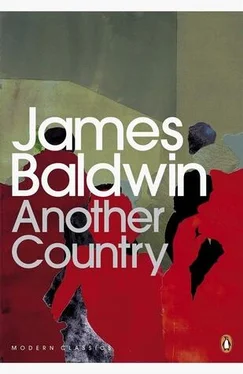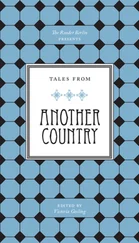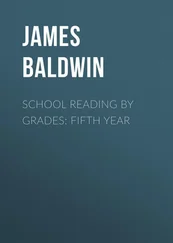She remembered a very young, striking, dark girl who wore a ruby-eyed snake ring. “Why, yes, I remember you very well. How are you?”
“I’m fine. Well”—with a small, dry laugh—“maybe I’m not so fine. I’m trying to locate my brother. I been calling Vivaldo’s house all morning, but he’s not home”—the voice was making an effort not to tremble, not to break—“and so I called you because I thought maybe you’d seen him, Vivaldo, I mean, or maybe you could tell me how to reach him.” And now the girl was crying. “You haven’t seen him, have you? Or my brother?”
She heard sounds coming from the children’s bedroom. “Please,” she said, “try not to be so upset. I don’t know where Vivaldo is this morning but I saw your brother last night. And he was fine.”
“You saw him last night? ”
“Yes.”
“Where’d you see him? Where was he?”
“We had a couple of drinks together in Benno’s.” Then she remembered Rufus’ face and felt a dim, unwilling alarm. “We talked for a while. He seemed fine.”
“Oh!”—the voice was flooded with relief and made Cass remember the girl’s smile—“wait till I get my hands on him!” Then: “Do you know where he went? Where’s he staying?”
The sounds from the bedroom suggested that Paul and Michael were having a fight. “I don’t know.” I should have asked him, she thought. “Vivaldo would know, they were together, I left them together — look—” Michael screamed and then began to cry, they were going to awaken Richard. “Vivaldo is coming by here this afternoon; why don’t you come, too?”
“What time?”
“Oh. Three-thirty, four. Do you know where we live?”
“Yes. Yes, I’ll be there. Thank you.”
“Please don’t be so upset. I’m sure everything will be all right.”
“Yes. I’m glad I called you.”
“Till later, then.”
“Yes. Good-bye.”
“Good-bye.”
Cass ran into the children’s bedroom and found Paul and Michael rolling furiously about on the floor. Michael was on top. She dragged him to his feet. Paul rose slowly, looking defiant and ashamed. He was eleven, after all, and Michael was only eight. “What’s all this noise about?”
“He was trying to take my chess set,” Michael said.
The box, the board, and broken chessmen were scattered on both beds and all over the room.
“I was not,” Paul said, and looked at his mother. “I was only trying to teach him how to play.”
“You don’t know how to play,” said Michael; now that his mother was in the room, he sniffed loudly once or twice and began collecting his property.
Paul did know how to play — or knew, anyway, that chess was a game with rules that had to be learned. He played with his father from time to time. But he also loved to torment his brother, who preferred to make up stories about his various chessmen as he moved them about. For this, of course, he did not need a partner. Watching Michael manipulate Richard’s old, broken chess set always made Paul very indignant.
“Never mind that,” Cass said, “you know that’s Michael’s chess set and he can do whatever he wants with it. Now, come on, wash up, and get your clothes on.”
She went into the bathroom to supervise their washing and get them dressed.
“Is Daddy up yet?” Paul wanted to know.
“No. He’s sleeping. He’s tired.”
“Can’t I go in and wake him?”
“No. Not this morning. Stand still.”
“What about his breakfast?” Michael asked.
“He’ll have his breakfast when he gets up,” she said.
“We never have breakfast together any more,” said Paul. “Why can’t I go and wake him?”
“Because I told you not to,” she said. They walked into the kitchen. “ We can have breakfast together now, but your father needs his sleep.”
“He’s always sleeping,” said Paul.
“You were out real late last night,” said Michael, shyly.
She was a fairly impartial mother, or tried to be; but sometimes Michael’s shy, grave charm moved her as Paul’s more direct, more calculating presence seldom could.
“What do you care?” she said, and ruffled his reddish blond hair. “And, anyway, how do you know?” She looked at Paul. “I bet that woman let you stay up until all hours. What time did you go to bed last night?”
Her tone, however, had immediately allied them against her. She was their common property; but they had more in common with each other than they had with her.
“Not so late,” Paul said, judiciously. He winked at his brother and began to eat his breakfast.
She held back a smile. “What time was it, Michael?”
“I don’t know,” Michael said, but it was real early.”
“If that woman let you stay up one minute past ten o’clock—”
“Oh, it wasn’t that late,” said Paul.
She gave up, poured herself another cup of coffee, and watched them eat. Then she remembered Ida’s call. She dialed Vivaldo’s number. There was no answer. He was probably at Jane’s, she thought, but she did not know Jane’s address, or her last name.
She heard Richard moving about in the bedroom and eventually watched him stumble into the shower.
When he came out, she watched him eat a while before she said,
“Richard—? Rufus’s sister just called.”
“His sister? Oh, yes, I remember her, we met her once. What did she want?”
“She wanted to know where Rufus was.”
“Well, if she doesn’t know, how the hell does she expect us to know?”
“She sounded very worried. She hasn’t seen him, you know — in a long time.”
“She’s complaining? Bastard’s probably found some other defenseless little girl to beat up.”
“Oh — that hasn’t got anything to do with it. She’s worried about her brother, she wants to know where he is.”
“Well, she hasn’t got a very nice brother; she’ll probably run into him someplace one of these days.” He looked into her worried face. “Hell, Cass, we saw him last night, there’s nothing wrong with him.”
“Yes,” she said. Then: “She’s coming here this afternoon.”
“Oh, Christ. What time?”
“I told her about three or four. I thought Vivaldo would be here by then.”
“Well, good.” He stood up. They walked into the living room. Paul stood at the window, looking out at the wet streets. Michael was on the floor, scribbling in his notebook. He had a great many notebooks, all of them filled with trees and houses and monsters and entirely cryptic anecdotes.
Paul moved from the window to come and stand beside his father.
“Are we going to go now?” he asked. “It’s getting late.”
For Paul never forgot a promise or an appointment.
Richard winked at Paul and reached down to cuff Michael lightly on the head. Michael always reacted to this with a kind of surly, withdrawn delight; seeming to say to himself, each time, that he loved his father enough to overlook an occasional lapse of dignity.
“Come on, now,” Richard said. “You want me to walk you to the movies, you got to get a move on.”
Then she stood at the window and watched the three of them, under Richard’s umbrella, walking away from her.
Twelve years. She had been twenty-one, he had been twenty-five; it was the middle of the war. She eventually ended up in San Francisco and got paid for hanging around a shipyard. She could have done better, but she hadn’t cared. She was simply waiting for the war to be over and for Richard to be home. He ended up in a quartermaster depot in North Africa where he had spent most of his time, as far as she could gather, defending Arab shoeshine boys and beggars against the cynical and malicious French.
Читать дальше












